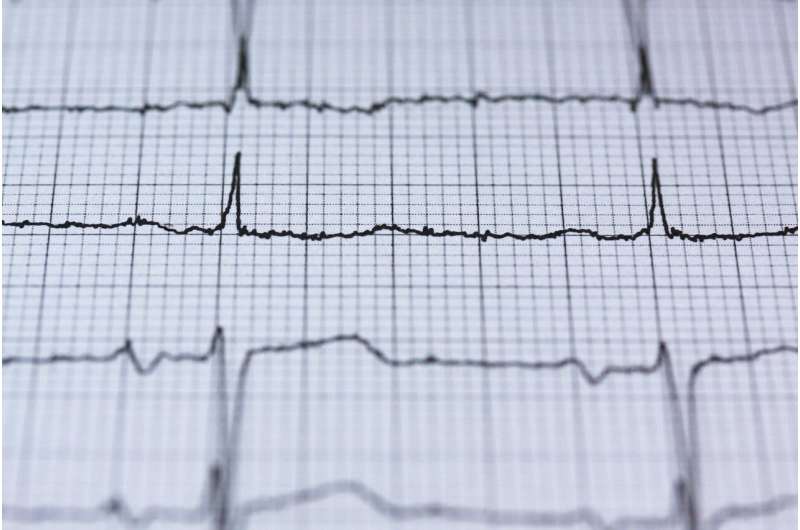This article has been reviewed according to Science X's editorial process and policies. Editors have highlighted the following attributes while ensuring the content's credibility:
fact-checked
peer-reviewed publication
trusted source
proofread
Investigators use AI to identify people with abnormal heart rhythms

Investigators from the Smidt Heart Institute at Cedars-Sinai found that an artificial intelligence (AI) algorithm can detect an abnormal heart rhythm in people not yet showing symptoms.
The algorithm, which identified hidden signals in common medical diagnostic testing, may help doctors better prevent strokes and other cardiovascular complications in people with atrial fibrillation—the most common type of heart rhythm disorder.
Previously developed algorithms have been primarily used in white populations. This algorithm works in diverse settings and patient populations, including U.S. veterans and underserved populations. The findings were published in JAMA Cardiology.
"This research allows for better identification of a hidden heart condition and informs the best way to develop algorithms that are equitable and generalizable to all patients," said David Ouyang, MD, a cardiologist in the Department of Cardiology in the Smidt Heart Institute at Cedars-Sinai, a researcher in the Division of Artificial Intelligence in Medicine, and senior author of the study.
Experts estimate that about one in three people with atrial fibrillation do not know they have the condition.
In atrial fibrillation, the electrical signals in the heart that regulate the pumping of blood from the upper chambers to the lower chambers are chaotic. This can cause blood in the upper chambers to pool and form blood clots that can travel to the brain and trigger an ischemic stroke.
To create the algorithm, investigators programmed an artificial intelligence tool to study patterns found in electrocardiogram readings. An electrocardiogram is a test that monitors electrical signals from the heart. People who undergo this test have electrodes placed on their body that detect the heart's electrical activity.
The program was trained to analyze electrocardiogram readings taken between Jan. 1, 1987, and Dec. 31, 2022, from patients seen at two Veterans Affairs health networks. The algorithm was trained on almost a million electrocardiograms and it accurately predicted patients would have atrial fibrillation within 31 days.
The AI model was also applied to medical records from patients at Cedars-Sinai and it similarly—and accurately—predicted cases of atrial fibrillation within 31 days.
"This study of veterans was geographically and ethnically diverse, indicating that the application of this algorithm could benefit the general population in the U.S.," said Sumeet Chugh, MD, director of the Division of Artificial Intelligence in Medicine in the Department of Medicine and medical director of the Heart Rhythm Center in the Department of Cardiology.
"This research exemplifies one of the many ways that investigators in the Smidt Heart Institute and the Division of Artificial Intelligence in Medicine are using AI to address preemptive management of complex and challenging cardiac conditions."
The study was a collaborative effort between physicians and investigators at Cedar-Sinai and the San Francisco and Palo Alto Veterans Affairs hospitals. In addition to Ouyang, Cedars-Sinai investigators Grant Duffy and John Theurer worked on the study.
The investigators plan to continue to study the algorithm as part of prospective clinical trials to learn if it helps identify those at risk for heart attack and stroke. They also plan to develop more AI algorithms.
More information: Deep learning of electrocardiograms in sinus rhythm from US Veterans to predict atrial fibrillation, JAMA Cardiology (2023). jamanetwork.com/journals/jama/ … jamacardio.2023.3701





















